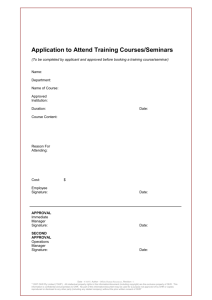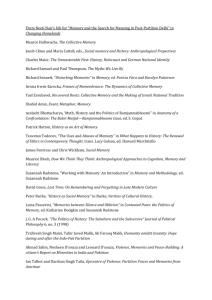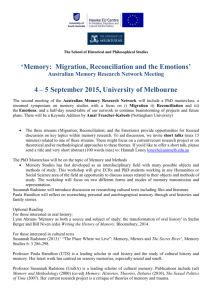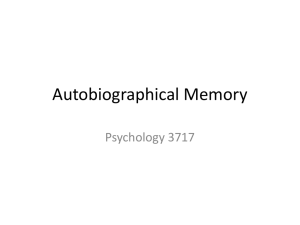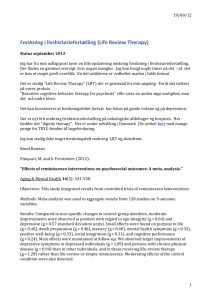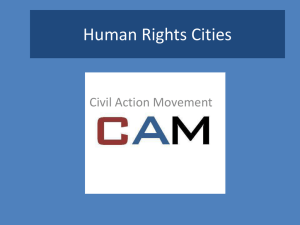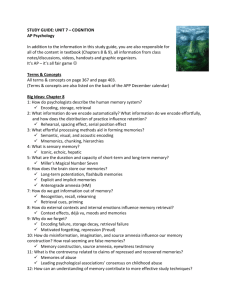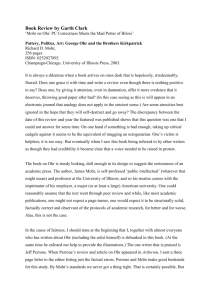Hall Carpenter Archives Gay Men`s Oral History Group, Walking
advertisement
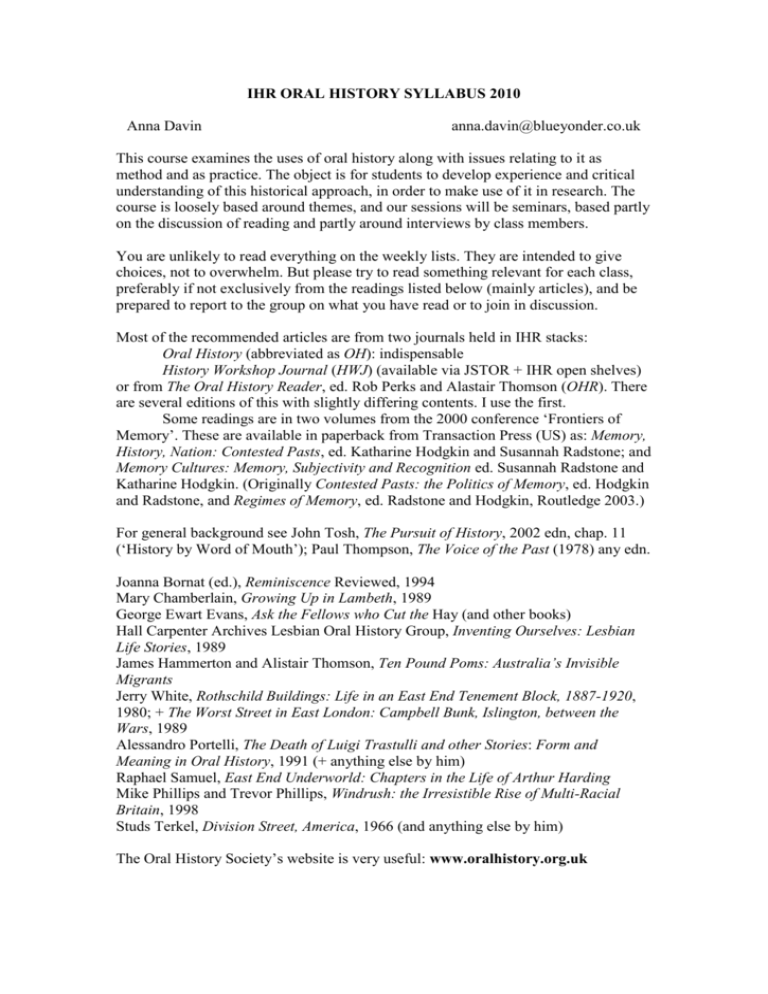
IHR ORAL HISTORY SYLLABUS 2010 Anna Davin anna.davin@blueyonder.co.uk This course examines the uses of oral history along with issues relating to it as method and as practice. The object is for students to develop experience and critical understanding of this historical approach, in order to make use of it in research. The course is loosely based around themes, and our sessions will be seminars, based partly on the discussion of reading and partly around interviews by class members. You are unlikely to read everything on the weekly lists. They are intended to give choices, not to overwhelm. But please try to read something relevant for each class, preferably if not exclusively from the readings listed below (mainly articles), and be prepared to report to the group on what you have read or to join in discussion. Most of the recommended articles are from two journals held in IHR stacks: Oral History (abbreviated as OH): indispensable History Workshop Journal (HWJ) (available via JSTOR + IHR open shelves) or from The Oral History Reader, ed. Rob Perks and Alastair Thomson (OHR). There are several editions of this with slightly differing contents. I use the first. Some readings are in two volumes from the 2000 conference ‘Frontiers of Memory’. These are available in paperback from Transaction Press (US) as: Memory, History, Nation: Contested Pasts, ed. Katharine Hodgkin and Susannah Radstone; and Memory Cultures: Memory, Subjectivity and Recognition ed. Susannah Radstone and Katharine Hodgkin. (Originally Contested Pasts: the Politics of Memory, ed. Hodgkin and Radstone, and Regimes of Memory, ed. Radstone and Hodgkin, Routledge 2003.) For general background see John Tosh, The Pursuit of History, 2002 edn, chap. 11 (‘History by Word of Mouth’); Paul Thompson, The Voice of the Past (1978) any edn. Joanna Bornat (ed.), Reminiscence Reviewed, 1994 Mary Chamberlain, Growing Up in Lambeth, 1989 George Ewart Evans, Ask the Fellows who Cut the Hay (and other books) Hall Carpenter Archives Lesbian Oral History Group, Inventing Ourselves: Lesbian Life Stories, 1989 James Hammerton and Alistair Thomson, Ten Pound Poms: Australia’s Invisible Migrants Jerry White, Rothschild Buildings: Life in an East End Tenement Block, 1887-1920, 1980; + The Worst Street in East London: Campbell Bunk, Islington, between the Wars, 1989 Alessandro Portelli, The Death of Luigi Trastulli and other Stories: Form and Meaning in Oral History, 1991 (+ anything else by him) Raphael Samuel, East End Underworld: Chapters in the Life of Arthur Harding Mike Phillips and Trevor Phillips, Windrush: the Irresistible Rise of Multi-Racial Britain, 1998 Studs Terkel, Division Street, America, 1966 (and anything else by him) The Oral History Society’s website is very useful: www.oralhistory.org.uk 1 18 Jan Introductory 2 25 Jan Ethics and ownership Readings Ethics statement on Oral History Society website: www.oralhistory.org.uk/ethics OH 26: 2, autumn 1998: Wendy Rickard, ‘“More Dangerous than Therapy”?’; + Sheena Rolph, ‘Ethical Dilemmas: Oral History Work with People with Learning Difficulties’ OH 31: 1, 2003: Barry S. Godfrey, ‘ “Reader I Killed Him”: Ethical + Emotional Issues in Researching Convicted Murderers through Analysis of Interview Transcripts’ OH 34: 1, 2006: Parita Mukta, ‘The Attrition of Memories: Ethics, Morality + Futures’ Oral History Review (US) 22:1, 1995: Valerie Yow, ‘Ethics and Interpersonal Relationships in Oral History Research’ OH 36:2 2008: Carrie Hamilton, ‘On Being a Good Interviewer: Empathy, Ethics + the Politics of Oral History’ OHR: (part 4) Kathleen Blee, ‘Evidence, Empathy + Ethics: Lessons from Oral Histories of the Klan’ OHR: (pt 5) Jane Mace, ‘Reminiscence as Literacy: intersections + creative moments’ 3 1 Feb The Interview Paul Thompson, The Voice of the Past, 1978, esp. chap. 6 + ‘Model Questions’ OHR, part 2: Kathryn Anderson + Dana C. Jack, ‘Learning to Listen: Interview Techniques + Analyses’ OH 26: 2. 1998: David Jones, ‘Distressing Histories + Unhappy Interviewing’ OH 24: 1, 1996: Jo Stanley, ‘Including the Feelings’ OH 31: 1, 2003: Rena Feld, ‘From the Interviewer’s Perspective: Interviewing Women Conscientious Objectors’ OH 32: 2 2004, Neil Rafeek, Angela Bartie + Hilary Young, ‘Scotland and “The Coalition for Justice Not War” March, Glasgow, 15 Feb. 2003’ If you have already made any interviews it would be very helpful for the class to hear something from them during this session. 4 8 Feb Life Histories HWJ 14, 1982: Angela Hewins, ‘The Making of a Working-class Biography, The Dillen’ (and Hewins, The Dillen, 1981, which I can lend) Mary Chamberlain + Paul Thompson, ‘Genre and Narrative in Life Stories’, in their Narrative and Genre, 1998 Peter Coleman, ‘Reminiscence within the Study of Aging’, in Reminiscence Reviewed, ed. Bornat OHR: (pt 2) Jan Walmsley, ‘Life History Interviews with People with Learning Disabilities’; Akemi Kikumura, ‘Family Life Histories: a Collaborative Venture’; (pt 5) Marjorie Shostak, ‘“What the Wind Won’t Take Away”: the genesis of Nisa – The Life and Words of a !Kung Woman’ OH 36:2, autumn 2008, ‘Chriss Bull, Alastair McIntosh + Colin Clark, ‘Land, Identity, School: Exploring Women’s Identity with Land in Scotland through the Experience of School’ Caroline Daley, ‘He would know, but I just have a feeling’, Women’s History Review 7: 3, Sept, 88 Ronald Fraser, In Search of a Past: the Manor House, Amnersfield, 1933-45, 1984 Raphael Samuel, East End Underworld: chapters in the Life of Arthur Harding, 1981 5 15 Feb Interpretation and Processing OHR part 4: Katherine Borland, ‘“That’s Not What I Said”: Interpretative Conflict in Oral Narrative Research’; Elizabeth Lapovsky Kennedy, ‘Telling Tales: Oral History and the Construction of pre-Stonewall Lesbian History’ (and any other articles in pt 4) OHR (part 5): Raphael Samuel, ‘The Perils of the Transcript’ HWJ 43, 1997: Mary Chamberlain, ‘Gender and the Narratives of Migration’ HWJ 48, 1999: Michelle Mouton and Helena Pohlandt McCormick, ‘Boundary Crossings: Oral History of Nazi Germany and Apartheid South Africa’ OH 35: 2, 2007: Anna Bryson, ‘“Whatever you Say, Say Nothing”: Researching Memory and Identity in mid-Ulster, 1945-1969’, Michael Frisch, A Shared Authority, chap. 5 (‘Preparing Interview Transcripts for Documentary Publication’) Sally Alexander, ‘The Mysteries + Secrets of Women’s Bodies: Sexual Knowledge in the 1st half of the 20c’, in Modern Times, ed. Mica Nava + Alan O’Shea OHR (part 4): Alistair Thomson, ‘Anzac Memories: Putting Popular Memory Theory into Practice in Australia’ 6 22 Feb Individual and Collective Remembering OH 32: 2, 2004: Anna Green, ‘Individual Remembering and “Collective Memory”: Theoretical Presuppositions and Contemporary Debates’ Katharine Hodgkin + Susannah Radstone, ‘Introduction’, Memory, History, Nation: Contested Pasts Marianne Hirsch + Leo Spitzer, ‘We Would Not Have Come Without You’, also in Memory, History, Nation: Contested Pasts Rigoberta Menchú, I Rigoberta Menchú: an Indian Woman in Guatemala, 1984 (NB check online for subsequent controversy) Paul Thompson, Introduction, Our Common History: the Transformation of Europe, ed. Paul Thompson with Natasha Burchardt, 1982 OH 26: 2, 1998: Nigel Hunt + Ian Robbins, ‘Telling Stories of the War: Aging Veterans Coping with their Memories through Narrative’, Hall Carpenter Archives Gay Men’s Oral History Group, Walking After Midnight: Gay Men’s Life Stories, 1989; Hall Carpenter Archives Lesbian Oral History Group, Inventing Ourselves: Lesbian Life Stories, 1989 OH 35: 2, 2007: Graham Smith, ‘Beyond Individual / Collective memory: Women’s Transactive memories of Food, Family and Conflict’ 7 1 March Memory and Political History OHR (part 1): Luisa Passerini, ‘Work Ideology and Consensus under Italian Fascism’ (also in HWJ 8, 1979 and in Our Common History) OH 34: 2, 2006, Alessandro Portelli, ‘So Much Depends on a Red Bus, or, Innocent Victims of the Liberating Gun’ Carrie Hamilton, ‘Memories of Violence in Interviews with Basque Nationalist Women’, in Memory, History, Nation: Contested Pasts HWJ 58, 2004: Yasmin Saikia, ‘Beyond the Archive of Silence: Narratives of Violence in the Liberation War of Bangladesh’ OH 35: 2, 2007: Christof Dejung, ‘Dissonant Memories: National Identity, Political Power, and the Commemoration of World War Two in Switzerland’ HWJ 57, spring 2004: Jocelyn Alexander + JoAnn McGregor, ‘War Stories: Guerrilla Narratives of Zimbabwe’s Liberation War’ David Ellwood + Anna Bravo, ‘Oral History and Resistance History in Italy’, in Our Common History. ed. Paul Thompson + Natasha Burchardt, 1982 Graham Dawson, Making Peace with the Past? Memory, Trauma and the Irish Troubles, 2007 8 8 March Oral History on Film ‘Somerstown’, Sue Crockford, 1982 (Thames TV documentary for Channel 4) 9 15 March Uses of Testimony HWJ 31, 1991: Greg Lanning, ‘Television History Workshop: the Brixton Tapes’ HWJ 31, 1981: Séamas O Catháin, ‘The Irish Folklore Archive’, OH 26: 2, 1998: Pam Schweitzer, ‘Oral History in Schools: We Want to Speak of Old Times’ Sally Alexander, ‘The Mysteries + Secrets of Women’s Bodies: Sexual Knowledge in the 1st half of the 20c’, in Modern Times: Reflections on a Century of Modernity, ed. Mica Nava + Alan O’Shea, 1996 HWJ 54, 2002: Steven High, ‘Deindustrializing Youngstown: Memories of Resistance and Loss following “Black Monday”’ HWJ 56, 2003: Jock McCulloch, ‘Asbestos Mining and Occupational Disease in Southern Rhodesia/ Zimbabwe, 1915-98’ OH 32: 2, 2004: Simon Guest, ‘Cure, Superstition, Infection and Reaction: Tuberculosis in Ireland, 1932-1957’ HWJ 65, spring 2008, Orlando Figes, ‘Private Life in Stalin’s Russia: Family Narratives, Memory and Oral History’ HWJ 66, autumn 2008, Shirli Gilbert, ‘Yiddish Songs + Holocaust Memory’ 10 22 March Oral History, Heritage and Public History Michael Frisch, A Shared Authority, chap. 2 (‘The Memory of History’) Patrick Wright, On Living in an Old Country (1985), Intro to new edn 2009 OHR (part 3): Joanna Bornat, ‘Oral History as a Social Movement: Reminiscence and Older People’ OH 28: 2, 2000: Uma Dhupelia-Mesthrie, ‘Dispossession and Memory: the Black River Community of Cape Town’; Hazel Tucker, ‘Tourism and the Loss of Memory in Zelve, Cappadocia’, OH 28: 2, 2000 OH 29: 2, 2001: Tony Kushner, ‘Oral History at the Extremes of Human Experience: Holocaust Testimony in a Museum Setting’ OH 32: 2, 2004: Stuart Davies and Crispin Paine, ‘Talking about Museums: the Insider’s Voice’ OH 35: 2, 2007: Sarah Housden and Jenny Zmorczek, ‘Exploring Identity in Later Life through BBC People’s War Interviews’ Anything in Memory, History, Nation: Contested Pasts ed. Hodgkin + Radstone, pt 3 11 29 March Final Workshop and review of the course
